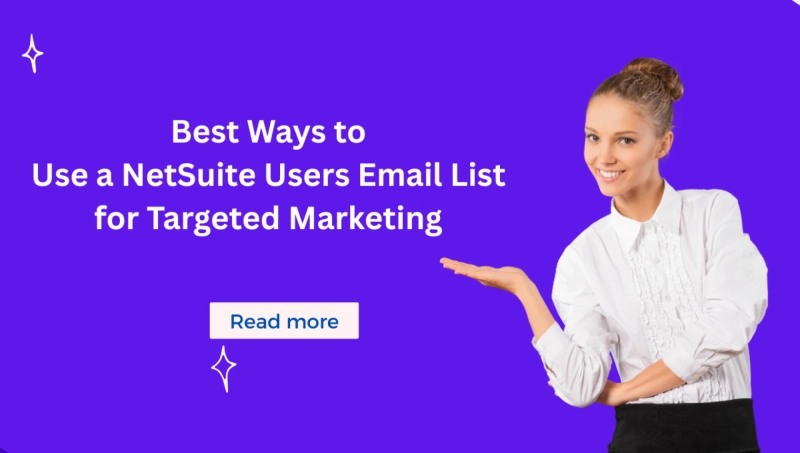NetSuite, a comprehensive cloud-based ERP (Enterprise Resource Planning) solution, is used by thousands of businesses worldwide to manage their finances, operations, customer relationships, and more. As a popular tool for organizations aiming for scalability and efficiency, NetSuite's users consist of decision-makers, business leaders, and professionals across diverse industries. For marketers, a NetSuite Users Email List provides an exceptional opportunity to reach a highly qualified, tech-savvy audience. This article explores the best strategies to use a NetSuite Users Email List for targeted marketing and how to maximize your campaigns' potential.
Understanding the Value of a NetSuite Users Email List
What is a NetSuite Users Email List?
A NetSuite Users Email List is a collection of contact details, including email addresses, for individuals or organizations that use or have adopted NetSuite ERP. These users typically include decision-makers such as CFOs, IT managers, and business executives from various industries like retail, manufacturing, professional services, and more.
Why Target NetSuite Users?
NetSuite users represent a valuable target group because they rely on sophisticated ERP systems to manage complex business operations. They are often decision-makers or influencers with purchasing power, and they have a strong interest in products and services that can improve efficiency, reduce costs, or complement their existing NetSuite system. By targeting this group, marketers can connect with individuals who are actively looking for solutions that integrate seamlessly with their current systems.
Segmentation: The Key to Targeted Marketing
Segmenting by Industry or Business Type
One of the most effective ways to use a NetSuite Users Email List is to segment it based on industry. Different sectors use NetSuite for other purposes, and understanding these nuances will allow you to craft targeted campaigns. For example:
- Retailers using NetSuite may be interested in inventory management solutions, e-commerce tools, or marketing automation services.
- Manufacturers may seek software that integrates with NetSuite for supply chain management, production planning, or analytics.
By customizing your emails based on industry-specific needs, you can increase the relevance of your campaigns and enhance engagement.
Segmenting by Role or Job Title
Another important segmentation criterion is the role or job title of the contact within the organization. NetSuite users may hold a variety of positions, and each role has distinct responsibilities and priorities. Consider targeting:
- CFOs or Finance Managers who may be more focused on financial planning, budgeting, and compliance solutions.
- IT Directors who are more likely to be interested in third-party software integrations, security features, and scalability.
- Marketing Managers who may be looking for tools to improve customer relationship management (CRM), email marketing, or lead nurturing.
Tailoring your messages based on the recipient's job role ensures you address the challenges they face in their specific function, leading to higher conversion rates.
Segmentation by Geographical Location
Location-based segmentation is another powerful tactic. Businesses across different regions may have unique challenges or regulatory requirements that can influence their decision-making. For example, NetSuite users in North America might be interested in compliance solutions for tax regulations, while users in Europe may need solutions that ensure GDPR compliance.
By refining your list according to geographical location, you can send region-specific offers and solutions, which increases the chances of your campaign resonating with the target audience.
Personalized Email Campaigns for Maximum Engagement
Crafting Personalized Messages
Personalization is key to making a meaningful connection with your audience. While using a NetSuite Users Email List, you can personalize your emails by referencing specific aspects of the recipient's business or industry. For example:
- "As a leading retail manager, we know how important it is to optimize your inventory management with a solution that seamlessly integrates with NetSuite."
- "Boost your financial operations with tools that integrate directly with NetSuite, improving efficiency and accuracy for your CFO team."
By showing a deep understanding of your recipient's needs and challenges, personalized emails foster trust and increase the likelihood of conversion.
Using NetSuite Data for Targeting
Leverage data from NetSuite interactions to craft highly relevant and targeted emails. If your email list includes information such as company size, current software integrations, or recent activity, you can create dynamic, data-driven campaigns. For instance:
- If a contact has previously searched for NetSuite inventory management solutions on your website, you could send an email promoting your advanced inventory software integrated with NetSuite.
- If a business is growing rapidly, it offers solutions that help scale with their needs, such as cloud-based reporting tools.
The more relevant your offer, the more likely your audience will engage.
A/B Testing for Optimization
A/B testing is a crucial method for optimizing email campaigns. By testing different elements such as subject lines, copy, and calls to action (CTAs), you can determine which approaches resonate best with your audience. For instance:
- Test two different subject lines: "Unlock Seamless Integration with NetSuite" vs "Maximize Your NetSuite Experience with Our Tools."
- Experiment with different CTAs: "Request a Demo" vs "Start Your Free Trial."
These insights allow you to refine your campaigns for better results continuously.
Leverage Multi-Channel Marketing for Broader Reach
Combine Email with Social Media Marketing
To expand the reach of your email campaigns, consider combining email marketing with social media advertising. Platforms like LinkedIn and Facebook offer advanced targeting options that enable you to reach NetSuite users based on their job titles, industries, or even specific software usage.
For example, you could run a LinkedIn ad campaign promoting a NetSuite-integrated product and follow up with an email offering more detailed information. Multi-channel marketing helps reinforce your message and increases the chances of capturing attention.
Retargeting NetSuite Users
Retargeting is an effective strategy for staying top of mind with NetSuite users who have shown initial interest but haven't converted. By using cookies to track website visitors, you can send them follow-up emails or display ads based on their previous interactions with your content.
For instance, if a user clicked on a product page related to a NetSuite integration but didn't sign up for a demo, you can send them a targeted email with a special offer or a reminder of the product's benefits.
Using Automation to Enhance Campaign Efficiency
Automating Follow-ups and Drip Campaigns
Email automation allows you to nurture leads over time without manual intervention. With a NetSuite Users Email List, you can set up automated email sequences (drip campaigns) to engage users at different stages of the buying journey. For example:
- Welcome Emails: Introduce your product and explain how it integrates with NetSuite.
- Educational Content: Provide helpful resources, such as case studies or webinars, that demonstrate the value of your solution.
- Conversion-focused Emails: Offer discounts or free trials to users who are close to making a purchasing decision.
This automated approach helps you stay engaged with prospects and build relationships that convert into sales.
Behavioral Triggers for Smart Campaigns
Utilize behavioral data (such as clicks, website visits, or previous purchases) to trigger emails automatically. For example, if a NetSuite user clicks on a specific feature of your product but doesn't act, you can send a follow-up email showcasing how that feature solves common pain points.
This personalized approach increases the relevance of your campaigns and enhances user engagement.
Metrics and KPIs: Measuring the Success of Your Campaign
Key Metrics to Track
To measure the success of your campaigns, it's essential to track key performance indicators (KPIs) such as:
- Open Rates: Indicates the effectiveness of your subject lines.
- Click-through Rates (CTR): Measures how many recipients clicked on links in your emails.
- Conversion Rates: Tracks the percentage of users who take the desired action (e.g., signing up for a demo or making a purchase).
- Return on Investment (ROI): Calculates the profitability of your campaigns.
By monitoring these metrics, you can adjust your strategy to improve future campaigns.
Using Data to Refine Campaigns
Data insights allow you to refine your email campaigns continuously. If a particular segment isn't responding well, consider tweaking your messaging or trying a different approach. Over time, this iterative process ensures that your campaigns become more efficient and effective.
Best Practices for Email List Management and Compliance
Maintaining a Clean and Updated Email List
A high-quality, clean email list is vital for ensuring deliverability and relevance. Regularly clean your NetSuite Users Email List to remove invalid or unengaged contacts. This reduces bounce rates and improves the overall effectiveness of your campaigns.
Complying with Email Regulations (GDPR, CAN-SPAM)
Ensure that your email marketing campaigns comply with global regulations such as the GDPR in Europe and CAN-SPAM in the U.S. This includes obtaining explicit consent from recipients, offering opt-out options, and securing their data.
Conclusion
Leveraging a NetSuite Users Mailing List for targeted marketing offers tremendous potential to engage decision-makers in industries that rely on NetSuite. By segmenting your list, personalizing your campaigns, and integrating multi-channel strategies, you can drive meaningful engagement and boost conversions. By measuring and optimizing your campaigns, you can ensure long-term success. Start using these strategies today to unlock the full potential of your NetSuite Users Email List and achieve your marketing goals.


